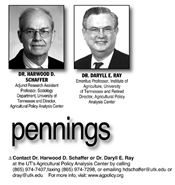USDA Reorganization Clumps Together Safety Net And Environmental Agencies In A New Administrative Unit

In addition to creating a new Under Secretary for Trade and Foreign Affairs (see http://tinyurl.com/k3whxsr and http://tinyurl.com/kkt6ywj), Secretary Sonny Perdue’s reorganization plan for the United States Department of Agriculture (USDA) proposes eliminating two under secretary positions and creating a second new under secretary position. In the process a number of agencies will be shifted within the USDA structure.
If that sounds complicated, it is not. That being said, the implications of the changes have raised some questions within the agriculture, environment, and rural development communities.
The proposal is to eliminate the Under Secretary for Farm and Foreign Agricultural Services, which includes the Foreign Agricultural Service (FAS), the Farm Service Agency (FSA) and the Risk Management Agency (RMA). The FAS would move to the new Under Secretary for Trade and Foreign Affairs, leaving FSA and RMA – the two domestically oriented farm safety net agencies – without a home.
To provide a home for them and “in order to create a customer-focused culture of public service and improve service delivery to agricultural producers the Department will create an Under Secretary for Farm Production and Conservation.” The intention behind this structural change is to “streamline program delivery to US farmers and ranchers and enhance resource efficiency.” In addition to the FSA and the RMA, the new undersecretary position will responsible for the Natural Resources Conservation Service (NRCS).
Some in the agricultural and environmental communities are already concerned that the environmental focus of the NRCS could take a back seat to farm safety net programs under this new structure. Proponents of farm safety net programs and environmental programs have often been in competition with each other for scarce financial resources during the writing of previous farm bills. These past struggles have created some distrust.
In addition, “the Chief of the [NRCS] and the Administrator of the [FSA] are directed to review office locations and administrative functions and within 60 days of this Secretarial Memorandum report to the Office of the Secretary opportunities to co-locate offices and share administrative services, consistent with legal requirements.”
The USDA says that “by combining farm conservation programs with farm safety net programs, the Under Secretary for Natural Resources and Environment (U/Sec NRE) will be able to focus more attention on the crucial task of managing our national forests and to ensure federal land managers are good and helpful neighbors to surrounding private land owners.” The US Forest Service will be the only agency reporting to the U/Sec NRE.
In the proposed restructuring, the position of Under Secretary for Rural Development will be eliminated and the Rural Development agencies “will report directly to the Secretary.” There are three Rural Development agencies.
The Rural Housing Service is responsible for single- and multi-family housing and community facilities in rural areas. The Rural Utilities Service is responsible for electric, telecommunications, and water and environmental programs. The RBCS provides services to rural businesses and cooperatives.
Critics of this shift have begun arguing that this represents a demotion of these services and will result in a reduction of USDA’s commitment to rural development. Secretary Perdue has stated that this is an elevation of rural development concerns because they will have direct access to his office.
Our observation over the years is that the process of organizational restructuring can create as many problems as they solve. In the restructuring debate that will take place in Congress, all affected parties will want to pay close attention to the details because once the restructuring is approved, all of us will have to live with it for quite a while. ∆
DR. HARWOOD D. SCHAFFER: Adjunct Research Assistant Professor, Sociology Department, University of Tennessee and Director, Agricultural Policy Analysis Center
DR. DARYLL E. RAY: Emeritus Professor, Institute of Agriculture, University of Tennessee and Retired Director, Agricultural Policy Analysis Center